Did you know that Truthout is a nonprofit and independently funded by readers like you? If you value what we do, please support our work with a donation.
Israeli forces killed at least 274 Palestinians and injured 698 in a horrific surprise raid of Nuseirat refugee camp on Saturday — one of the most deadly single assaults by Israel so far amid its genocide in Gaza.
The Palestinian health ministry reports that Israeli troops killed 64 children and wounded 153 children during their daytime raid of the crowded civilian neighborhood; casualties from the attack have now overwhelmed the only remaining hospital in the central Gaza region, Al-Aqsa Martyrs Hospital.
In the operation, the Israeli army rescued four Israeli hostages who were captured by Hamas forces in October. In spite of — or perhaps because of — the sheer number of Palestinians who Israeli forces killed during the assault, Israeli officials described it as a “surgical operation, like a brain operation.”
Palestinians who survived the massacre, many just narrowly, recalled it as harrowing and indescribable. Israeli forces surrounded the targeted complex and prevented people from leaving as they unleashed bombs on the region and shot Palestinians on sight, witnesses told Mondoweiss.
“The street was full of people, and suddenly, all of them… They were on the ground, and smoke and blood filled the place. Everywhere we looked, shelling and shrapnel were flying,” 11- year-old Tawfiq Abu Youssef told Mondoweiss. He is receiving treatment in Nasser Hospital after being pulled out from underneath the rubble of his home in Nuseirat.
“I stayed under the rubble for hours. I did not think for a moment that I might survive and see life again. I had lived through death enough while I was under the rubble. That was death. I do not think I will forget or get over these moments,” the child said.
If Youssef had not been rescued from the rubble, it’s unclear if his death would have been included in the death count for the massacre, as officials’ death counts do not include those who are missing under the rubble.
Major media outlets like The New York Times framed the massacre as a clever mission carried out by Israeli forces, with the help of American intelligence officials, to free hostages. Many outlets failed to mention the hundreds of Palestinians who Israeli troops killed and injured in headlines, only referencing the hostages; the Times doesn’t even mention the death toll until the 11th paragraph of their story on the operation, and dedicates just a few sentences to those killed.
Corporate outlets also nearly universally failed to mention the thousands of Palestinians who Israeli forces are imprisoning without charges in torture camps.
Heinously, the White House has issued a statement describing the massacre as a “successful” and “daring operation.” The statement, attributed to National Security Advisor Jake Sullivan, does not spare a single word for the Palestinians killed in the attack.
Israeli forces deliberately carried out the attack in the middle of the day, with officials claiming the timing would maximize the surprise element in order to free the hostages. But carrying out attacks in broad daylight also maximizes the deaths of Palestinian civilians, humanitarian groups have said.
“The one problem with operating during the day is civilians are all about. And some of the bombs clearly fell on or adjacent to a market in al-Nuseirat, which is filled with people. And so, in those circumstances, you, predictably, will get larger numbers of civilian casualties than if it had been a nighttime operation,” former Human Rights Watch director Kenneth Roth said in an interview with Al Jazeera.
“That is inconsistent with the duty to take all feasible precautions to spare civilian harm,” Roth said.
The least deadly way for Israel to secure the release of more hostages would be to agree to a ceasefire deal with Hamas that would bring an end to fighting and civilian casualties. However, with Israeli Prime Minister Benjamin Netanyahu purposefully prolonging Israel’s invasion of Gaza, Israeli officials have repeatedly refused deals for a ceasefire in return for Israeli hostages. (One of those deals, proposed by Hamas officials shortly after Oct. 7, included the release of all hostages in order to prevent an Israeli invasion of Gaza, according to officials.)
Press freedom is under attack
As Trump cracks down on political speech, independent media is increasingly necessary.
Truthout produces reporting you won’t see in the mainstream: journalism from the frontlines of global conflict, interviews with grassroots movement leaders, high-quality legal analysis and more.
Our work is possible thanks to reader support. Help Truthout catalyze change and social justice — make a tax-deductible monthly or one-time donation today.
